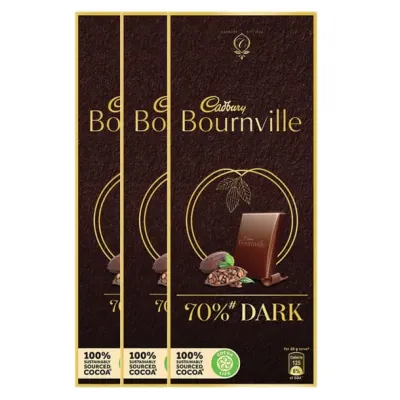Dark Chocolate vs Milk Chocolate: A Comprehensive Guide [August, 2024]
Several parameters come into the picture when you are comparing dark chocolate vs milk chocolate. Both these chocolates have their particular flavours and textures. Further, these chocolates are versatile; you can pair them with different ingredients to enhance their flavours.

While both chocolate types have their benefits, let’s try to understand which is better. This guide will help you better understand the nutritional values of the two chocolates and how they differ.
What is Dark Chocolate?
Dark chocolate is one of the purest forms of chocolate available in the market. It contains cacao beans and sugar. This chocolate also contains vanilla essence at times, as it can get quite bitter, and there must be an ingredient to cut into the bitterness. The best part about dark chocolate is that it is easy to temper, and you can mould them into any shape or size.
Most dark chocolates also contain milk solids, but their proportion does not increase by more than 12%. The ratio of milk solids is very low in pure dark chocolates. The best kind of dark chocolates enhances the flavour profile of cacao beans.
What is Milk Chocolate?
If you want to conduct an analysis on milk chocolates vs dark chocolates, you need to understand what milk chocolate is and how it is different from dark chocolate. In 1689, an Anglo-Irish physician Sir Hans Sloane mixed chocolate with milk and sold it as a drink. That is how milk chocolate was formed.
Milk chocolate contains cacao, milk, and sugar. It also contains 10% chocolate liquor and different kinds of milk solids. Milk chocolate has more sugar compared to any other form of chocolate.
Now that we have understood the fundamentals let us understand how the nutritional facts are different for both of these chocolates.
Milk Chocolates vs Dark Chocolates: Nutritional Facts

While the core ingredients of both chocolates are almost the same, the proportion of the ingredients might vary drastically. Hence, the nutritional value of both chocolates is different. The nutrition facts of both chocolates are as follows:
| Component | Dark Chocolate | Milk Chocolate |
| Calories | 170 | 153 |
| Fat | 12.1g | 8.7g |
| Protein | 2.21g | 2g |
| Carbohydrates | 13g | 16g |
| Fiber | 3.09g | 0.67g |
| Sugars | 6.8g | 14g |
| Magnesium | 64.6mg | 16.8mg |
| Potassium | 203mg | 103mg |
| Iron | 3.37mg | 1.0mg |
Milk chocolate has fewer calories as compared to dark chocolate. However, it is less nutritious and healthy than dark chocolate. The fibre content makes dark chocolate healthier compared to milk chocolate.
Milk Chocolates vs Dark Chocolates: Benefits
Both milk chocolate and dark chocolates have their own set of benefits. Let’s have a look at the milk and dark chocolate benefits.
Dark Chocolate Benefits

- Dark chocolate is rich in fibre and is considered very nutritious. Dark chocolates with a higher content of cocoa are even more nutritious.
- It contains stearic acid, which naturally affects body cholesterol.
- It is a powerful source of antioxidants. It has several organic compounds that work as antioxidants.
- Dark chocolate is believed to improve blood flow in humans. It also lowers blood pressure by stimulating endothelium.
- It can protect you from different kinds of heart diseases as it decreases the level of bad cholesterol and LDL and increases the level of good cholesterol in the body.
- According to several studies, consuming flavanol-rich cocoa or chocolate over time has been demonstrated to reduce blood pressure and enhance cardiovascular health.
- Dark chocolate also contains bioactive compounds that can add to your skin’s radiation.
- One of the best dark chocolate benefits is that it can protect your skin from the UV rays of the sun. Hence, it is a quite popular food item across all beachy areas.
- Several studies have shown that dark chocolate can improve brain function and it improves verbal learning and memory.
Milk Chocolate Benefits

- Milk chocolates are a powerhouse of nutrients. They are rich in minerals like iron, potassium, copper, etc.
- These are popularly used for making post-workout drinks as it is considered a great ingredient for a good post-recovery drink.
- The proper amount of carbs are included in milk chocolate drinks, which might aid in replenishing your muscles.
- Milk chocolates can eliminate heart diseases like heart attacks and strokes.
- The best thing about milk chocolates is that they contain an abundance of micronutrients and are rich in vitamins.
Milk Chocolates vs Dark Chocolates: Cons
While dark chocolate and milk chocolates are rich in nutrients, they have added sugar. Hence, there are some disadvantages to consuming these forms of chocolates. Let’s understand why these chocolates might be bad for you if overconsumed.
Dark Chocolate Cons
- Dark chocolate should be consumed in moderate quantities. However, as these types of chocolates are rich in caffeine, it is unsuitable for pregnant women as they can endanger the fetus.
- Breastfeeding mothers must avoid consuming dark chocolates as they can get transferred to the child and lead to insomnia and rashes.
- Dark chocolate can interfere with blood clotting; hence, it is unfit for people suffering from bleeding disorders.
- These can add to the pulse rate and increase blood pressure if you take them in large quantities.
Milk Chocolate Cons
- Milk chocolates are low in cocoa. Hence, finding the benefits of cocoa in milk chocolates is difficult.
- The amount of sugar is too high in milk chocolates. It can cause diseases like diabetes and increase body weight if consumed in high quantities.
- The calorie count of milk chocolates is quite high. A 100 g of the chocolate bar contains around 535 calories.
- Milk chocolates are low in vitamins and minerals; hence, they don’t provide the needed quantity of micronutrients to the body.
- The saturated fat content in chocolates is also quite high, which can lead to heart disease and several other lifestyle diseases.
Wrapping up
Chocolate is an age-old ingredient that has been around for a while. It is used in a variety of dishes as it is versatile. A great proportion of the audience consumes both dark chocolates and milk chocolates. While these chocolates come with great benefits, they have some demerits as well. Both chocolates should be consumed in moderation.
When it comes to milk chocolates vs dark chocolates, dark chocolate is slightly better as it is low in sugar. It also has a greater cocoa content, making it rich in micro and macronutrients.
FAQs
Q. What is the quantity of caffeine in dark chocolate?
An ounce of dark chocolate that has 70% of cocoa contains 20-25 mg of caffeine.
Q. Which kind of dark chocolate is the best for you?
Dark chocolate with a high percentage of cocoa is considered healthy and can be consumed in small quantities.
Q. Can dark chocolate aid in weight loss?
Dark chocolate contains monounsaturated fatty acids, increasing metabolism and aiding in weight loss.

Product prices and availability are subject to change. Any price and availability information displayed on merchant's site at the time of purchase will apply to the purchase of these products. HappyCredit is a participant in the Amazon Services LLC Associates Program, an affiliate advertising program. As part of this program, we may earn commission from qualifying purchases made through the affiliate links provided on this website. We only promote products on Amazon that we genuinely believe are of high quality and value to our audience. The inclusion of affiliate links does not influence our editorial content or product recommendations. Our primary goal is to provide useful information and help you make informed purchasing decisions.
Certain portions of the text in this article might have been created using AI tools and subsequently edited by the author to improve the overall quality and clarity of the content for readers.
![Dark Chocolate vs Milk Chocolate: A Comprehensive Guide [August, 2024] Dark Chocolate vs Milk Chocolate: A Comprehensive Guide [August, 2024]](https://happycredit.in/cloudinary_opt/blog/opt-lqiucl.webp)











